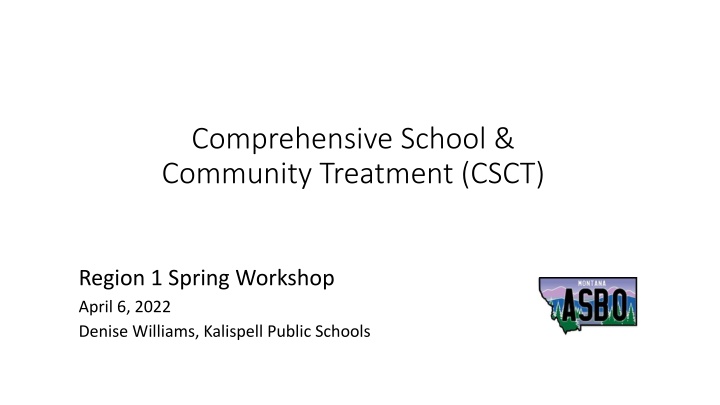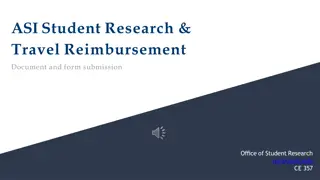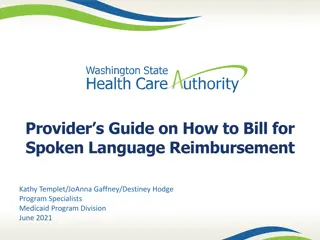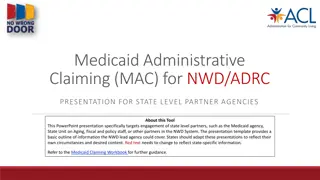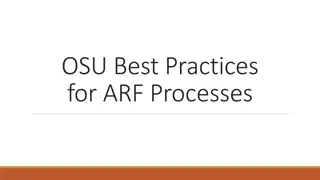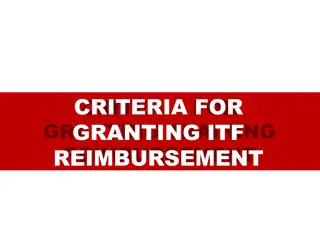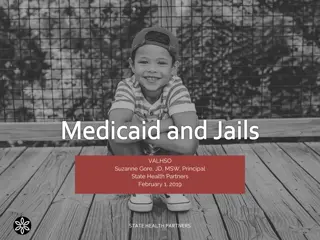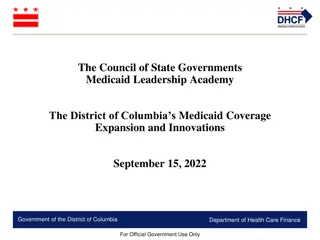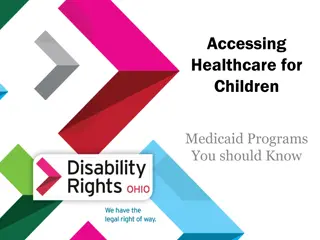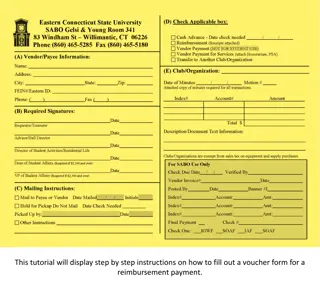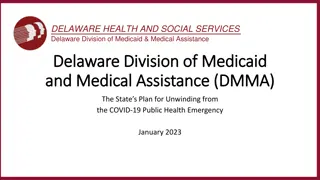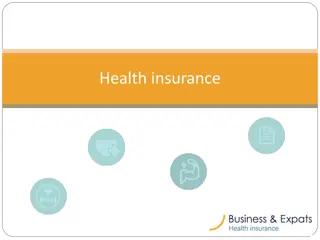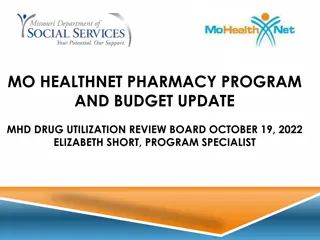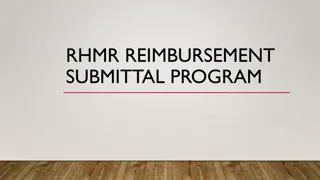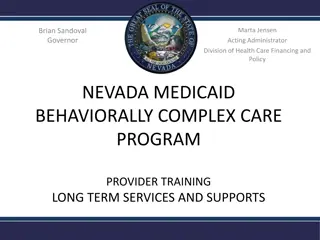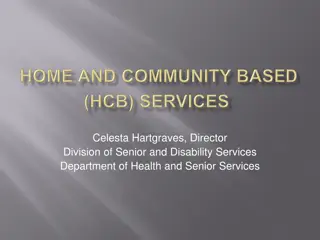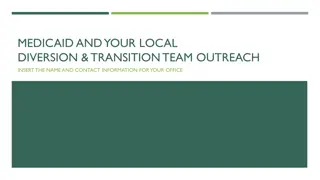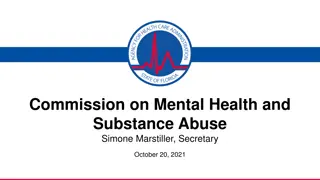Medicaid Reimbursement in School-Based Health Services
This comprehensive resource delves into the intricacies of Medicaid reimbursements for school-based health services, focusing on the Comprehensive School & Community Treatment (CSCT) program. It covers eligibility criteria, methodologies, meeting match requirements, federal regulations, and the process for schools to certify their local match. The content highlights the importance of Medicaid in funding services for Medicaid-enrolled children with or without an IEP, and sheds light on the role of different service providers in school districts.
Download Presentation

Please find below an Image/Link to download the presentation.
The content on the website is provided AS IS for your information and personal use only. It may not be sold, licensed, or shared on other websites without obtaining consent from the author.If you encounter any issues during the download, it is possible that the publisher has removed the file from their server.
You are allowed to download the files provided on this website for personal or commercial use, subject to the condition that they are used lawfully. All files are the property of their respective owners.
The content on the website is provided AS IS for your information and personal use only. It may not be sold, licensed, or shared on other websites without obtaining consent from the author.
E N D
Presentation Transcript
Comprehensive School & Community Treatment (CSCT) Region 1 Spring Workshop April 6, 2022 Denise Williams, Kalispell Public Schools
Comprehensive School & Community Treatment (CSCT) Background information Methodologies used for meeting match requirements 20-9-240, MCA Funding For School-Based Medical Services Terminology Process as we understand it today Other issues to consider Q&A
Background Medicaid pays for covered services provided to: Medicaid-enrolled children and adolescents Children who have an IEP (Individual Education Plan) under the IDEA (Individuals with Disabilities Education Act) or children who do not have an IEP CSCT is one of several school-based health service programs eligible for federal Medicaid reimbursement CSCT is for school based mental health services School districts provide the services, typically through contracts with providers such as AWARE, Altacare, Shodair, Intermountain Children s Home, Yellowstone Boys & Girls Ranch, etc. Usually, a room or rooms at the school building(s) is designated solely for this purpose Likely involves school district special education staff (manage IEPs, arrange for services, etc.)
Background Medicaid reimbursements are administered through Montana DPHHS (Dept. of Public Health and Human Services) Montana DPHHS plan is approved by CMS (Centers for Medicare & Medicaid Services U.S. Dept. of Health & Human Services) Several rules involved in receiving FFP (federal financial participation), including but not limited to: Schools, providers in schools or school-based health centers must meet federal and state requirements for Medicaid providers LEA (local education agency, i.e. school) must contribute non-federal dollars to help meet the full cost of the services. This is referred to as the local match. DPHHS plan must include the methodology used for demonstrating the local match
Background How do schools meet the local match requirement? Prior to June 30, 2020 referred to as soft match DPHHS sent school a COM (Certification of Match) cover letter with instructions on how certify their local match requirement for the previous fiscal year Schools accessed CSCT Match module in MAEFAIRS to enter key information # of CSCT students Match requirement amount (calculated and provided by DPHHS in the COM) Square feet of CSCT room Square feet of entire building Using TFS expenditure data, a schedule of Eligible Non-Federal Expenditures for CSCT Match is generated
FFP Medicaid funding is roughly 65% of total costs Local match is roughly 35% of total costs
Calculation of local match
Background Issues The GAO (U.S. Government Accountability Office) and the OIG (Health and Human Services Office of Inspector General raised concerns about Medicaid billing for school-based services, including CSCT CMS had to update its guidance and oversight In 2016, CMS disallowed Montana DPHHS methodology for the local match DPHHS appealed CMS ruling and received forbearance up until CMS stood firm. Soft match methodology ended June 30, 2020 DPHHS had its own state funds and used them as a hard match to keep the program running for FY 2021
Methodologies used for meeting match requirements Certified Public Expenditure (CPE) soft match a statutorily recognized Medicaid financing approach by which a governmental entity, including a governmental provider (e.g., LEA), incurs an expenditure eligible for FFP under the state s approved Medicaid state plan ( 1903(w)(6) of the Social Security Act, 42 CFR 433.51) LEA certifies that the funds expended are public funds used to support the full cost of providing the Medicaid-covered service or the administrative activity Based on this certification, the state (DPHHS) is able to claim the federal share of these costs
Methodologies used for meeting match requirements Certified Public Expenditure (CPE) CPE-based financing must recognize actual costs incurred CMS requires providers to use a CMS-approved cost reporting methodology to document the actual cost of providing the services determined through: a CMS-approved statistically valid time study, periodic cost reporting, and reconciliation of any interim payments to actual incurred cost. For qualifying school-based administrative activities, the amount of time that school staff members spend on Medicaid-related activities is typically determined based on time studies; LEAs do an annual reconciliation of their actual local costs to req d amount Risk of claw back (refund to feds) for any excess federal funds received
Methodologies used for meeting match requirements Intergovernmental Transfer (IGT) - hard match a transfer of funds from a governmental entity (e.g., a school district or other state agency) to the Medicaid agency (DPHHS) before a Medicaid payment is made when these funds are used as the non-federal share of a Medicaid expenditure, they are eligible for federal matching funds Basic process: School district submits claims for services provided in schools to the DPHHS, which will in turn calculate the non-federal share School districts sends non-federal share to state Claims paid by the DPHHS full amount (federal and non-federal share) paid to the school district that provided the service Third-party provider (mental health center or other contractor) usually submits the claim to DPHHS on behalf of the school district
Methodologies used for meeting match requirements Intergovernmental (IGT) In use since FY2020 DPHHS used funds available within its budget until July 1, 2021 Bridge funding used July 1, 2021 December 28, 2021 Memorandum of Understanding (MOU) outlines the IGT process effective January 1, 2022 Certified Public Expenditure (CPE) No longer in use, but still an allowable option State s plan with CMS must be amended; approval may take up to 18 months Involves time studies, etc. Risk of claw-back of funds after the fiscal year is over
20-9-240, MCA Funding For School-Based Medical Services (HB671 - Bedey) Includes the following provisions related to CSCT: OPI and DPHHS charged with collaborating to find a solution Legislative intent is to minimize administrative burden on school districts DPHHS must provide technical support to OPI Training Establishment of provider rates Coordination with CMS to ensure federal reimbursement for eligible services OPI must provide technical support to school districts Training Accounting guidance Collaboration with DPHHS in communicating with school districts
20-9-240, MCA Funding For School-Based Medical Services (HB671 - Bedey) Created a school-based services account in the state special revenue fund Receives matching funds from school districts Fulfills financial requirements of the CMS for Medicaid reimbursement HB2 appropriated approx. $2.2 million as bridge funding, beginning July 1, 2021 OPI and DPHHS worked on IGT (Intergovernmental Transfer) process District sends local match to OPI OPI verifies, administers collection of the $$, then transfers matching funds to DPHHS DPHHS distributes CSCT reimbursement to school districts School district deposits in Fund X15 Miscellaneous Programs
Terminology Provider the school district; also referred to as LEA LEA Local Education Agency Mental Health Service Provider the organization that the school district contracts with to provide mental health services, such as YBGR, AWARE, Altacare, ICH, etc. DPHHS Montana Dept. of Public Health & Human Services CHMB Children s Mental Health Bureau (within DPHHS) OPI Office of Public Instruction CMS - Centers for Medicare & Medicaid Services U.S. Dept. of Health & Human Services SPA State Plan Amendment; agreement between the state (DPHHS) and CMS
Terminology IGT Intergovernmental Transfer; method by which a provider meets the local match requirement to obtain federal Medicaid funding; also referred to as hard match CPE Certified Public Expenditure; method by which a provider meets the local match requirement to obtain federal Medicaid funding; also referred to as soft match or in-kind match MMIS Medicaid Management Information Services; claims for CSCT reimbursement are submitted and processed in this system. The state and local match for claims that meet the criteria are calculated in the MMIS. NPI - National Provider Identifier; number identifying a provider ICN Internal Control Number; a number identifying a claim Suspended claim a claim that has met all the criteria and is suspended for payment until the state match is received
IGT Process as we understand it today Requirements: 1. MOU signed by DPHHS, OPI and Provider (school district); send completed CSCT MOU to Christine White at chwhite@mt.gov 2. Monthly match payment MMIS system calculates based on claims submitted DPHHS notifies OPI OPI notifies school district of amount School district pays via paper check or ACH (Access.gov) 3. Monthly CSCT Certification Form Certifies the match payment is from a non-federal source Signed by the district s authorized representative
Other Issues to Consider MOU get it signed and sent to Christine White at chwhite@mt.gov Effective date is now Jan. 1, 2022 (Section 3) Contains provision that CSCT reimbursement funds may not be used for future CSCT match payments (Section 6) Double-indemnity language added (Section 8) Contracts with Mental Health Service Providers the contract rate seems to be around $62.40 (65% of the approved rate of $96) Contact DPHHS (Meghan Peel) to discuss Sending Match Payment to the OPI OPI plans to accept electronically through an online system called Access.gov Can submit a paper check if your county treasurer doesn t allow ACH
Other Issues to Consider Accounting Guidance Feb. 8 version posted on OPI website has concerning language: Reimbursement (page 2) refers to program income and the last sentence: The school district is required to return any program income to DPHHS . At the Dec. 29 meeting, DPHHS made it very clear, they do not expect funds to be returned to them under the IGT process. Flow Chart (page 4) in the far right-hand column, last green box, it s labeled District Returns Overpayment to DPHHS . Might need to be removed if item above is resolved.
Other Issues to Consider Accounting Guidance Accounting entries
Other Issues to Consider Frequently Asked Questions (FAQ) Q9. OPI recommends a school district have identified CSCT program costs that meet the required match amount. Initial documentation of CSCT program costs as a requirement to receiving the monthly federal reimbursement payment has been lifted. Q24. The board of trustees can determine other uses of the funds. Refers to CSCT federal reimbursement funds received by the district and deposited to Fund X15. After MHC bill is paid, what can be done with the remaining funds. Can t be spent on future match payments.
Other Issues to Consider Frequently Asked Questions (FAQ)
Comprehensive School & Community Treatment (CSCT) INFORMATION ON THE OPI WEBSITE: 1. Go to the OPI Home Page 2. Hover cursor on Families & Students, then click on Suicide Prevention 3. Scroll down until you find this click on it Which takes you to the Medicaid Services page Past CSCT Meeting Information Accounting Guidance [OPI working on updates] IGT Overview and CSCT Monthly IGT Timeline for State FY2022 Match Expenditure Detail Form [OPI working on updates] Provider Monthly Report [OPI working on updates]
